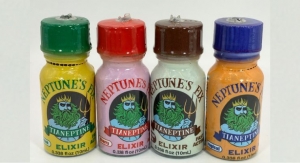By Mike Montemarano, Associate Editor10.01.20
In light of the COVID-19 pandemic, virtually all sectors of the dietary supplements industry have seen a spike in both sales and consumer interest. A wide range of herbal and botanical supplements have long been heralded—often for thousands of years—for their perceived benefits to immune support, stress resilience, cognitive health, and sleep. Each of these benefits are more meaningful to consumers today during the public health crisis.
Supplies of certain plant species are under pressure as sales have spiked. Beyond immunity, plenty of herbs that fall into the camps of adaptogens and nootropics, known to support mood and cognitive function, are likewise experiencing sales increases, even as these herbs were already attracting attention before the pandemic.
Leading botanical experts have expressed concern about sudden spikes in demand for a multitude of reasons. Many of the plant species people consume for health benefits today were already experiencing threats in the wild, prior to still-mounting interest this year. Climate change, urban sprawl, over-harvesting, and pollution preceded a level of consumption that some are not sure could be sustained over the long term.
A host of plants and mushrooms, which are often considered more preferable by consumers if they are harvested from wild habitats, are of particular concern to industry experts. While many of these species are economically viable to farm in controlled settings, losing wild populations due to human activity can create a set of far-reaching ecological harms, and supply issues.
The breadth of consumer surveys from recent years have identified top immune support ingredients within the herbs and botanicals market as elderberry, echinacea, garlic, ginseng, reishi, and plenty more from traditional medicines. Ayurveda and Traditional Chinese Medicine have been of particular interest to consumers in recent years.
Momentum for sustainability and quality within the herbal industry has never been more clear than it has become over the past several years. While the level of demand for immune-supporting herbs is virtually unprecedented, there are a number of well-established blockchain, auditing, testing, and cultivating tools companies can use to protect their sustainability and transparency efforts. There are also a number of problems known to occur when demand for certain herbal products peaks.
Mark Blumenthal, the founder and executive director of the American Botanical Council, and editor in chief of the publication HerbalGram, discussed some of his takeaways from the boom in sales that herbal dietary supplements have experienced in light of the COVID-19 pandemic, and what it means for sustainable production, during the virtual Plant Medicine for Modern Epidemics Summit, which was hosted by the Shift Network.
“People who were among the first to start stocking their pantries with herbs were already pretty knowledgeable, and were already using herbs for general health and well-being,” Blumenthal said. “We’ve observed a short-term boom in sales, rightfully or not, depending on how people choose to buy and use these products. It depends on their expectations and intentions for usage. Now, the demographic has spread out beyond the traditional herb or supplement user, to millions more people who may have taken a multivitamin or a specific herb for something.”
“It’s creating lots of strain on the industry when it comes to supply chains,” Blumenthal said. “There’s been a huge increase in demand for various herbal ingredients, particularly elderberry, which has been a relatively popular herb over the past several years […] the bottom line is that, after COVID has passed, more people will be using botanicals that hadn’t prior to 2020, motivated and pushed by these concerns.”
Sustainability concerns within the industry will fall into multiple camps, centered around both the ecological impacts that increased demand for herbs will have, in addition to issues of equity for those involved in the vast network of herb supply, and how the industry sustains a certain set of quality standards.
“I use the term ‘value network’ instead of the term ‘supply chain,’ because it’s not always linear, and value network implies and includes the people who are putting their life and their work from the very beginning of harvesting a plant in the wild, or on plots, gardens and farms in both the U.S. and developing countries all over the world,” Blumenthal said. “We (the American Botanical Council) focus on the value of the people involved, in addition to the Sustainable Herbs Program, which we introduced in November 2018. We focus on a number of questions. Do you know where your herbs come from? […] How can we create a fair market economy and consumer consciousness in which people are willing to pay more, not less, and get what they’re paying for while sharing the wealth and value of their products in less industrialized nations? Based on our economy, some along the value chain are making just a few dollars a day. Sustainability means providing programs that increase the quality of life and economic well-being for those in the value network. Of course, there’s also the whole issue of the climate crisis.”
The Climate Crisis
Many medicinal herbs are adversely affected by climate change to various degrees. Blumenthal said the medicinal plants and fungi most affected by climate change are those whose natural habitats are in the Arctic circle, which includes a pretty prominent roster. Species such as Rhodiola, and a number of fungi including Chaga, have evolved over millions of years to thrive in extremely specific climatic conditions, in regions of Canada, Russia, and Scandinavia. Outside of controlled indoor cultivating operations, these plants may not exist for much longer.
“These plants can’t scurry up a mountain to a cooler place,” Blumenthal said. “Despite successful cultivation programs in Canada and Russia and the rest of the Arctic Circle, these plants won’t be growing in the wild.”
These plants will be a canary in a coal mine as other regions become more adversely affected by the compounding changes to the global ecosystem that arise as a result of the warming climate. Blumenthal said that part of a preservationist effort will involve a better understanding of the compounds that help these plants exist in the wild in the first place, as in new settings these plants will have entirely different chemical profiles, which could affect the degree to which they’re beneficial to humans. Even the same plant species can vary in quality based on the conditions in which cultivation happens, presenting a challenge to the quality of certain botanical ingredients, which may impact their efficacy.
“This is already happening with tea in China, so much so that people can tell just by taste. The chemistry of the tea had changed completely due to climatic issues,” Blumenthal said. “Plants’ chemistries can change daily, seasonally, and based on the soil they’re growing in. How you compare this to a baseline to develop any meaningful conclusions regarding an environmental factor will be a very challenging proposition.”
Wild ginseng and goldenseal, both of which are threatened species in China and the U.S., respectively, are examples of botanicals used for immune support that have come under pressure from climate change. Wild ginseng has been virtually wiped out in Asia, rendering only commercially-cultivated ginseng products accessible. Ethical wild-crafting operations are underway for goldenseal—a plant grown in the forests of Appalachia—however, little is known about how much of a goldenseal population there was historically compared to today due to the impracticality of measuring a plant population that is mostly sourced from the wild. Nonetheless, the species has been threatened since 1997, Blumenthal reported.
Specific to issues of ecological and social sustainability, the American Botanical Council publishes a great deal of information through its Sustainable Herbs Program, a multimedia platform that catalogues the best practices associated with medicinal herbs around the globe.
Quality Issues Can’t Be Understated
It’s common knowledge within the industry that especially at times in which supply can’t keep up with demand, rogue companies may adulterate products for an economic edge. All herbs are susceptible to adulteration in some form, and product testing often reveals cases, such as non-organic posing as organic, or even synthetic materials designed to mimic natural active compounds.
Botanicals may also be adulterated with inactive parts of the same plant, used to dilute the active ingredients in order to achieve more volume with a smaller amount of what’s valuable, which is the most common form of adulteration for certain adaptogenic herbs such as ashwagandha and others valued specifically for their roots.
Blumenthal and a team at the American Botanical Council have been cataloguing instances of adulteration they’ve found specifically from people in the field who’ve made complaints or allegations of fraudulent practices.
“Customers want or expect benefits based on the exact ingredients that were used in clinical trials,” Blumenthal said. “Results might not be carried over to a generic product, or to an alternative compound.”
With ABC’s Botanical Adulterants Prevention Program (BAPP), “[They] get all kinds of information from people in the industry, compile it all, and run it through a peer review,” Blumenthal said. “We have a team of about 25 people from the government, the industry, and academia, and to date we’ve published almost 60 BAPP publications that are absolutely free to anyone who wants them. Adulteration can be defined in sum by a lack of disclosure on the part of a supplier or company, and always works for the economic benefit of the seller, to the economic,and sometimes health detriment of a consumer or supplier.”
Blumenthal said that while it’s still too early to understand the extent to which adulteration may be on the rise across the herbs and botanicals marketplace, he’s not alone in being particularly concerned at this time with the supply of elderberry. According to HerbalGram, within the first six months of 2020, sales of finished commercial products containing elderberry grew by 126% and 241% in the natural and mainstream channels, respectively.
“There’s a lot of elder coming out of China, which might be the same genus, but not the same species being marketed, and some of the material—the anthocyanins, the pigments making it dark—might also come from black rice hulls or black soybean. It’s a cheap way of making it look like the real thing,” he said. “I don’t want to be a prophet of doom and gloom, I’m a pretty optimistic guy. There are many, many good companies and people doing quality work, selling legitimate products that are authentic and may have a great deal of benefit to people’s health, lifestyles, and homes.”
Blumenthal said he feels that at this time, the industry should face the question of whether these reputable companies will “become the norm,” or if they will be “an admirable subset of the bigger conversation.”
In some more troubling news that goes even beyond adulteration, third-party testing facility Alkemist Labs recently issued a warning to the industry about certain actors falsifying certificates of analysis (COA). The company reported it is not alone in being targeted by this practice. Some violations include doctoring COAs to replace a client name, a lot number, and even the results of an analysis, presenting false information on a digital and/or print COA breaking down falsified compositions of plant parts in an attached product lot.
This legally actionable form of fraud happened to Alkemist recently, in May, the company said. Several of its industry contacts received e-mails promoting elderberry botanical extracts—with attached lab reports appearing as Alkemist Labs documents—purporting to show identity of Sambucus nigra (elderberry). In reality, the linked report was altered significantly from the original version, providing false information which was then used for marketing purposes, without any attribution.
“We see this sort of thing from time to time, but lately it’s more common,” said Elan Sudberg, CEO of Alkemist Labs. “With the supply chain strained, some companies are buying from people they have not yet vetted, and should proceed with extreme caution. It’s essential that whenever material changes hands, it’s tested.”
Sudberg suggested companies should e-mail COAs to Alkemist for report verification, a further step for companies to ensure the reports they are receiving have results matching what’s on file at the testing facility.
Supplies of certain plant species are under pressure as sales have spiked. Beyond immunity, plenty of herbs that fall into the camps of adaptogens and nootropics, known to support mood and cognitive function, are likewise experiencing sales increases, even as these herbs were already attracting attention before the pandemic.
Leading botanical experts have expressed concern about sudden spikes in demand for a multitude of reasons. Many of the plant species people consume for health benefits today were already experiencing threats in the wild, prior to still-mounting interest this year. Climate change, urban sprawl, over-harvesting, and pollution preceded a level of consumption that some are not sure could be sustained over the long term.
A host of plants and mushrooms, which are often considered more preferable by consumers if they are harvested from wild habitats, are of particular concern to industry experts. While many of these species are economically viable to farm in controlled settings, losing wild populations due to human activity can create a set of far-reaching ecological harms, and supply issues.
The breadth of consumer surveys from recent years have identified top immune support ingredients within the herbs and botanicals market as elderberry, echinacea, garlic, ginseng, reishi, and plenty more from traditional medicines. Ayurveda and Traditional Chinese Medicine have been of particular interest to consumers in recent years.
Momentum for sustainability and quality within the herbal industry has never been more clear than it has become over the past several years. While the level of demand for immune-supporting herbs is virtually unprecedented, there are a number of well-established blockchain, auditing, testing, and cultivating tools companies can use to protect their sustainability and transparency efforts. There are also a number of problems known to occur when demand for certain herbal products peaks.
Mark Blumenthal, the founder and executive director of the American Botanical Council, and editor in chief of the publication HerbalGram, discussed some of his takeaways from the boom in sales that herbal dietary supplements have experienced in light of the COVID-19 pandemic, and what it means for sustainable production, during the virtual Plant Medicine for Modern Epidemics Summit, which was hosted by the Shift Network.
“People who were among the first to start stocking their pantries with herbs were already pretty knowledgeable, and were already using herbs for general health and well-being,” Blumenthal said. “We’ve observed a short-term boom in sales, rightfully or not, depending on how people choose to buy and use these products. It depends on their expectations and intentions for usage. Now, the demographic has spread out beyond the traditional herb or supplement user, to millions more people who may have taken a multivitamin or a specific herb for something.”
“It’s creating lots of strain on the industry when it comes to supply chains,” Blumenthal said. “There’s been a huge increase in demand for various herbal ingredients, particularly elderberry, which has been a relatively popular herb over the past several years […] the bottom line is that, after COVID has passed, more people will be using botanicals that hadn’t prior to 2020, motivated and pushed by these concerns.”
Sustainability concerns within the industry will fall into multiple camps, centered around both the ecological impacts that increased demand for herbs will have, in addition to issues of equity for those involved in the vast network of herb supply, and how the industry sustains a certain set of quality standards.
“I use the term ‘value network’ instead of the term ‘supply chain,’ because it’s not always linear, and value network implies and includes the people who are putting their life and their work from the very beginning of harvesting a plant in the wild, or on plots, gardens and farms in both the U.S. and developing countries all over the world,” Blumenthal said. “We (the American Botanical Council) focus on the value of the people involved, in addition to the Sustainable Herbs Program, which we introduced in November 2018. We focus on a number of questions. Do you know where your herbs come from? […] How can we create a fair market economy and consumer consciousness in which people are willing to pay more, not less, and get what they’re paying for while sharing the wealth and value of their products in less industrialized nations? Based on our economy, some along the value chain are making just a few dollars a day. Sustainability means providing programs that increase the quality of life and economic well-being for those in the value network. Of course, there’s also the whole issue of the climate crisis.”
The Climate Crisis
Many medicinal herbs are adversely affected by climate change to various degrees. Blumenthal said the medicinal plants and fungi most affected by climate change are those whose natural habitats are in the Arctic circle, which includes a pretty prominent roster. Species such as Rhodiola, and a number of fungi including Chaga, have evolved over millions of years to thrive in extremely specific climatic conditions, in regions of Canada, Russia, and Scandinavia. Outside of controlled indoor cultivating operations, these plants may not exist for much longer.
“These plants can’t scurry up a mountain to a cooler place,” Blumenthal said. “Despite successful cultivation programs in Canada and Russia and the rest of the Arctic Circle, these plants won’t be growing in the wild.”
These plants will be a canary in a coal mine as other regions become more adversely affected by the compounding changes to the global ecosystem that arise as a result of the warming climate. Blumenthal said that part of a preservationist effort will involve a better understanding of the compounds that help these plants exist in the wild in the first place, as in new settings these plants will have entirely different chemical profiles, which could affect the degree to which they’re beneficial to humans. Even the same plant species can vary in quality based on the conditions in which cultivation happens, presenting a challenge to the quality of certain botanical ingredients, which may impact their efficacy.
“This is already happening with tea in China, so much so that people can tell just by taste. The chemistry of the tea had changed completely due to climatic issues,” Blumenthal said. “Plants’ chemistries can change daily, seasonally, and based on the soil they’re growing in. How you compare this to a baseline to develop any meaningful conclusions regarding an environmental factor will be a very challenging proposition.”
Wild ginseng and goldenseal, both of which are threatened species in China and the U.S., respectively, are examples of botanicals used for immune support that have come under pressure from climate change. Wild ginseng has been virtually wiped out in Asia, rendering only commercially-cultivated ginseng products accessible. Ethical wild-crafting operations are underway for goldenseal—a plant grown in the forests of Appalachia—however, little is known about how much of a goldenseal population there was historically compared to today due to the impracticality of measuring a plant population that is mostly sourced from the wild. Nonetheless, the species has been threatened since 1997, Blumenthal reported.
Specific to issues of ecological and social sustainability, the American Botanical Council publishes a great deal of information through its Sustainable Herbs Program, a multimedia platform that catalogues the best practices associated with medicinal herbs around the globe.
Quality Issues Can’t Be Understated
It’s common knowledge within the industry that especially at times in which supply can’t keep up with demand, rogue companies may adulterate products for an economic edge. All herbs are susceptible to adulteration in some form, and product testing often reveals cases, such as non-organic posing as organic, or even synthetic materials designed to mimic natural active compounds.
Botanicals may also be adulterated with inactive parts of the same plant, used to dilute the active ingredients in order to achieve more volume with a smaller amount of what’s valuable, which is the most common form of adulteration for certain adaptogenic herbs such as ashwagandha and others valued specifically for their roots.
Blumenthal and a team at the American Botanical Council have been cataloguing instances of adulteration they’ve found specifically from people in the field who’ve made complaints or allegations of fraudulent practices.
“Customers want or expect benefits based on the exact ingredients that were used in clinical trials,” Blumenthal said. “Results might not be carried over to a generic product, or to an alternative compound.”
With ABC’s Botanical Adulterants Prevention Program (BAPP), “[They] get all kinds of information from people in the industry, compile it all, and run it through a peer review,” Blumenthal said. “We have a team of about 25 people from the government, the industry, and academia, and to date we’ve published almost 60 BAPP publications that are absolutely free to anyone who wants them. Adulteration can be defined in sum by a lack of disclosure on the part of a supplier or company, and always works for the economic benefit of the seller, to the economic,and sometimes health detriment of a consumer or supplier.”
Blumenthal said that while it’s still too early to understand the extent to which adulteration may be on the rise across the herbs and botanicals marketplace, he’s not alone in being particularly concerned at this time with the supply of elderberry. According to HerbalGram, within the first six months of 2020, sales of finished commercial products containing elderberry grew by 126% and 241% in the natural and mainstream channels, respectively.
“There’s a lot of elder coming out of China, which might be the same genus, but not the same species being marketed, and some of the material—the anthocyanins, the pigments making it dark—might also come from black rice hulls or black soybean. It’s a cheap way of making it look like the real thing,” he said. “I don’t want to be a prophet of doom and gloom, I’m a pretty optimistic guy. There are many, many good companies and people doing quality work, selling legitimate products that are authentic and may have a great deal of benefit to people’s health, lifestyles, and homes.”
Blumenthal said he feels that at this time, the industry should face the question of whether these reputable companies will “become the norm,” or if they will be “an admirable subset of the bigger conversation.”
In some more troubling news that goes even beyond adulteration, third-party testing facility Alkemist Labs recently issued a warning to the industry about certain actors falsifying certificates of analysis (COA). The company reported it is not alone in being targeted by this practice. Some violations include doctoring COAs to replace a client name, a lot number, and even the results of an analysis, presenting false information on a digital and/or print COA breaking down falsified compositions of plant parts in an attached product lot.
This legally actionable form of fraud happened to Alkemist recently, in May, the company said. Several of its industry contacts received e-mails promoting elderberry botanical extracts—with attached lab reports appearing as Alkemist Labs documents—purporting to show identity of Sambucus nigra (elderberry). In reality, the linked report was altered significantly from the original version, providing false information which was then used for marketing purposes, without any attribution.
“We see this sort of thing from time to time, but lately it’s more common,” said Elan Sudberg, CEO of Alkemist Labs. “With the supply chain strained, some companies are buying from people they have not yet vetted, and should proceed with extreme caution. It’s essential that whenever material changes hands, it’s tested.”
Sudberg suggested companies should e-mail COAs to Alkemist for report verification, a further step for companies to ensure the reports they are receiving have results matching what’s on file at the testing facility.




























